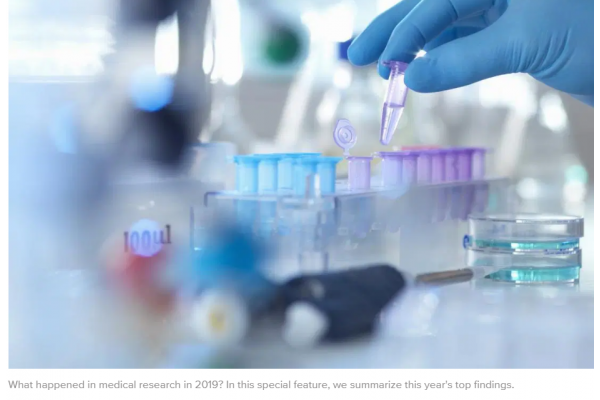What were the top findings?
December 23, 2019
Source: drugdu
 553
553
Another busy year for clinical research has come and gone. What are the most important findings from 2019? Here is our overview of some of the most noteworthy studies of the year.What happened in medical research in 2019? In this special feature, we summarize this year's top findings.
"Medicine is of all the Arts the most noble," wrote the Ancient Greek physician Hippocrates — whom historians call the "father of medicine" — over 2,000 years ago.
Advances in therapeutic practices have been helping people cure and manage illness since before the time of Hippocrates, and, today, researchers continue to look for ways of eradicating diseases and improving our well-being and quality of life.Each year, specialists in all areas of medical research conduct new studies and clinical trials that bring us a better understanding of what keeps us happy and in good health, and what factors have the opposite effect.

And, while each year, experts manage to overcome many obstacles, challenges old and new keep the medical research field buzzing with initiatives.
Reflecting on how research has evolved over the past decade, the editors of the reputable journal PLOS Medicine — in a recent editorial — emphasize "ongoing struggles" with infectious diseases, as well as growing tensions between two approaches in medical research. These approaches are the effort of finding treatments that are consistently effective in large populations versus the notion of "precision medicine," which favors therapy that we closely tailor to an individual's very personal needs.
But how has clinical research fared in 2019? In this special feature, we look at some of the most prominent areas of study from this year and give you an overview of the most noteworthy findings.
Friends or foes?
The medication we take — as long as we follow our doctors' advice — is meant to help us fight off disease and improve our physical or mental well-being. But can these usually trusty allies sometimes turn into foes?
Most drugs can sometimes cause side effects, but more and more studies are now suggesting a link between common medication and a higher risk of developing different conditions.
In March this year, for instance, experts affiliated with the European Resuscitation Council — whose goal is to find the best ways to prevent and respond to cardiac arrest — found that a conventional drug doctors use to treat hypertension and angina may actually increase a person's risk of cardiac arrest.
By analyzing the data of more than 60,000 people, the researchers saw that a drug called nifedipine, which doctors often prescribe for cardiovascular problems, appeared to increase the risk of "sudden cardiac arrest."
By editor
Read more on
- Driven by drugs for lowering blood sugar and losing weight, the export value of Chinese Western medicine preparations has reached a record high February 2, 2026
- Chengdu Pioneer and Kangzhe Pharmaceutical have reached a cooperation agreement to leverage the DEL and HAILO platforms to empower the development of multi-target innovative drugs February 2, 2026
- J&J’s subcutaneous monoclonal antibody combination therapy receives further FDA approval; Autoimmune CAR-T therapy granted FDA Breakthrough Therapy Designation February 2, 2026
- Why is the development of AI-based antiviral drugs a niche field yet a necessity? February 1, 2026
- Pakistan issues final antidumping ruling on Chinese cephalosporin February 1, 2026
your submission has already been received.
OK
Subscribe
Please enter a valid Email address!
Submit
The most relevant industry news & insight will be sent to you every two weeks.



